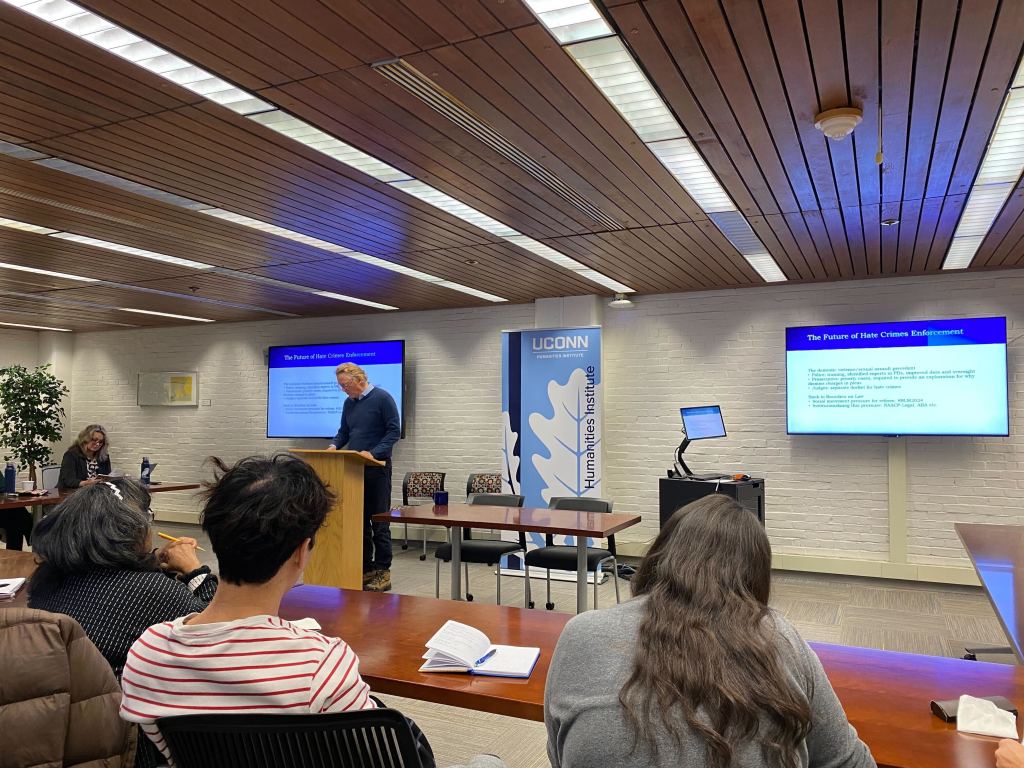Yesterday the University of Connecticut’s Humanities Institute hosted a Fellow’s Talk led by Dr. Richard Ashby Wilson, the board of trustees professor of law and anthropology. His speech detailed his research about how recent police reforms have either succeeded or failed and whether or not the criminal justice system handles hate crimes properly.
Initially, Wilson recounted his time at a training seminar in upstate New York where police officers were taught how to better handle hate crime cases to prevent discrimination. “For a long time the police were the face of oppression,” Wilson stated.
Wilson brought up staggering statistics, revealing that only about 10-15% of hate crimes lead to a conviction in Connecticut, while other crimes have an approximate 85% conviction rate. “Hate crimes are simply invisible, they remain invisible to the criminal justice system,” Wilson commented.
Yet these training seminars and presentations can only go so far. Birgit Brander Rasmussen, an associate professor in the Binghamton University English department,went on to mention the fact that “cops don’t like anybody but cops to teach them.”
The reasons behind the reforms stem from the Black Lives Matter movement and a push for lawmakers to change local police behavior. Wilson called the BLM movement the “racial reckoning” of the U.S. criminal justice system. Wilson’s research focuses on how hate crimes are being combated. He mentions that 50 states introduced 300 police reform bills, dozens of cities and states created new hate crime statutes and the U.S. Department of Justice hosted 200 community events under the umbrella campaign “United Against Hate.”
What made Wilson skeptical about the police reforms and retraining was that it wasn’t always realized the local level. Sometimes the training would give the false impression of identity equalization — the idea that hate impacts all of us equally. Research has shown that Black Americans are by far the group that suffers the most discrimination and hate crimes. The training done on the local level is mostly just reviews of statutes with little historical reflection, Wilson commented. Training performed by the DOJ was much more extensive and taken seriously. It’s often found that police officers don’t see the training as an opportunity to continue their education, but an unfortunate presentation that they have to sit through once a year.
While the situation appears to be bleak, Wilson and Rasmussen stated that any work is progress and more can be done to further it. A precedent that shows the criminal justice system can be reformed are cases of domestic violence and sexual assault. Wilson mentioned that “the ways in which sexual assault is handled now is very different from how it was in the 1980s.”
He went on to describe how the reforms don’t just stop at the police, but also with prosecutors and judges. “Prosecutors could prioritize cases and be required to explain why they dismiss certain charges when reaching plea deals,” Wilson stated. “Judges could also put hate crimes in a separate docket, instead of letting them be lost amongst the other hundreds of cases.”
This post was originally published on this site be sure to check out more of their content.







